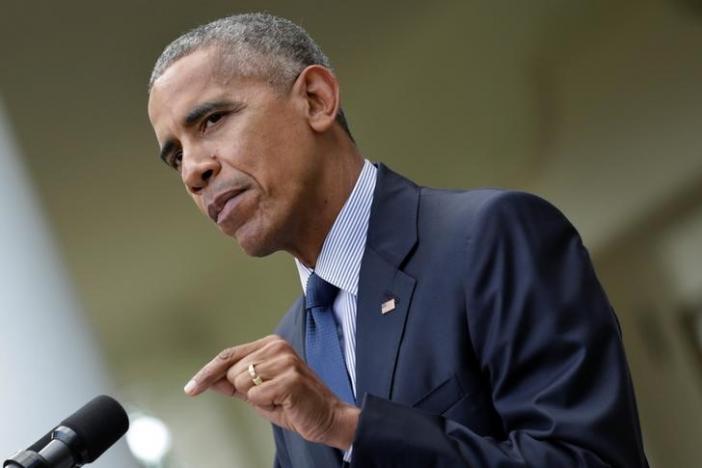
European nations, Canada, Bolivia and Nepal raised backing for the 2015 Paris Agreement to countries representing 56.87 percent of world greenhouse gas emissions, above the 55 percent needed for implementation, a United Nations website showed.
The Paris climate summit
The deal will formally start in 30 days on November 4, four days before the US presidential election in which Republican Donald Trump opposes the accord and Democrat Hillary Clinton strongly supports it. China and the United States joined up last month in a joint step by the world's top emitters.
Obama called Wednesday "a historic day in the fight to protect our planet for future generations" and he told reporters on the White House Rose Garden: "If we follow through on the commitments that this Paris agreement embodies, history may well judge it as a turning point for our planet."
Germany, France, Austria, Hungary, Slovakia, Portugal and Malta - European Union nations which have completed domestic ratification and account for about four percent of emissions - formally signed up on Wednesday. In total, 73 countries out of 195 have ratified the agreement, according to the UN website.
"Great job!" tweeted European Climate Commissioner Miguel Arias Canete. The Europeans brought forward a formal submission of documents to the United Nations from a ceremony planned on Friday, fearing that other nations might ratify and trigger entry into force without them.
Paris human chain gives emotional jolt to climate summit
"We didn't want to be upstaged," an EU diplomat said. Many praised the rapid ratification of an agreement meant to cut global greenhouse gas emissions, mainly from burning fossil fuels, to limit floods, droughts, more powerful storms and rising ocean levels.
"What once seemed unthinkable is now unstoppable," UN Secretary-General Ban Ki-moon said in a statement. But all said more work was needed. "It is no exaggeration to say we are in a race against time," said Thoriq Ibrahim, Environment Minister for the Maldives and Chair of the Alliance of Small Island States which fears the impact of rising sea levels.
By contrast, it took eight years for the previous UN climate deal, the 1997 Kyoto Protocol, to gain enough backing to take effect. It obliged only rich nations to cut emissions and the United States stayed out of it. Opposition continues in the Republican-controlled US Congress to Democrat Obama's climate change policies.
"The Paris climate deal would be disastrous for the American economy," said House of Representatives Speaker Paul Ryan, a Republican. By contrast, Paul Polman, CEO of Unilever and Chairman of the World Business Council for Sustainable Development, said ratification showed that a shift to a low-carbon economy is "urgent, inevitable, and accelerating faster than we ever believed possible".
Climate change 'significant and direct' threat to U.S. military: reports
Still, current national pledges for cuts in emissions are insufficient to achieve a Paris goal of limiting a rise in world temperatures to "well below" two degrees Celsius (3.6 Fahrenheit) above pre-industrial times. UN studies project that average world temperatures are set to rise by 3 degrees (5.4 Fahrenheit) or more by 2100, based on current trends. And this year is expected to prove the warmest since records began in the 19th century, beating 2015.




1734780406-0/Untitled-(11)1734780406-0-165x106.webp)


1734782942-0/Untitled-design-(24)1734782942-0-270x192.webp)
1734770488-0/Untitled-design-(3)1734770488-0-270x192.webp)
1734242367-0/Copy-of-Untitled-(4)1734242367-0-270x192.webp)





1734587529-0/Express-Tribune-(1)1734587529-0-270x192.webp)







COMMENTS
Comments are moderated and generally will be posted if they are on-topic and not abusive.
For more information, please see our Comments FAQ